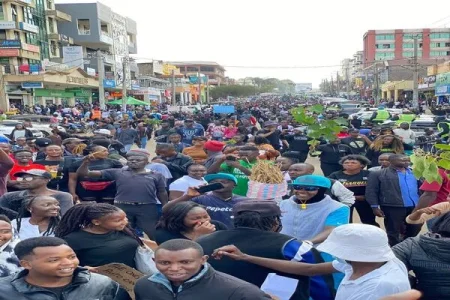
Thousands of young Kenyans took to the streets on Thursday, protesting against proposed tax hikes in a vibrant display of Gen-Z activism. The demonstrations, dubbed "Occupy Parliament," began in Nairobi on Tuesday before spreading nationwide.
In the capital, police fired tear gas and water cannons at protesters near parliament, but the action remained largely peaceful. Demonstrators, dressed in colorful attire, blew whistles and chanted slogans like "Ruto must go," expressing their discontent with President William Ruto's economic policies.
The protests have galvanized widespread anger over the government's proposed tax increases, which come at a time when the country is already grappling with a cost-of-living crisis. Many young Kenyans, like 26-year-old Ivy, fear for their future. "This bill cannot pass. This bill is going to finish us. We don't have jobs... we can't even open businesses," she told AFP.
Despite the government's concessions earlier in the week, including rolling back proposed levies on bread, car ownership, and mobile services, protesters remain unsatisfied. The government now plans to increase fuel prices and export taxes to fill the budget gap, a move critics say will further burden citizens.
The protests have spread to other cities, including Mombasa, Nakuru, and Kisumu, with thousands assembling to voice their concerns. The demonstrations have been largely led by young Kenyans, many of whom are participating in protests for the first time.
As parliament debates the finance bill, with a vote expected on June 27, the nation watches closely. The proposed taxes aim to raise significant revenue and reduce the budget deficit, but at what cost to the struggling population?
With a third of Kenya's 51.5 million people living in poverty and inflation remaining stubbornly high, the outcome of these protests could have far-reaching implications for the country's economic future and the relationship between its young population and the government.




